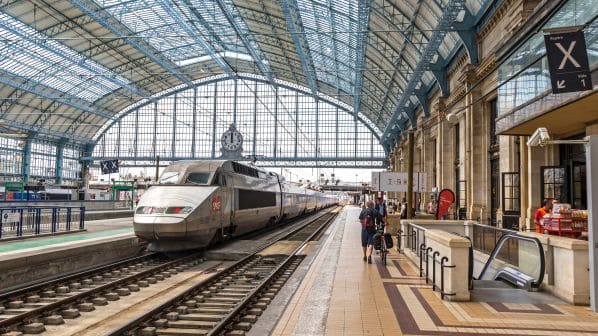FRENCH National Railways (SNCF) has reported strong performance in its 2022 annual results, with revenue up to €41.45bn while the railway reported a net profit of €2.42bn.
Revenue was up 19% compared with 2021 and up 18% on 2019, with nearly 40% coming from outside France. Ebitda rose 55% compared with 2021, with an Ebitda to revenue ratio of 16%, up from 12.5% in 2021.
Rail ridership rose sharply at passenger business SNCF Voyageurs, reflecting the appeal of commuter rail and high-speed leisure travel in France and other European countries. Freight and logistics subsidiary Geodis continued to deliver high growth, with volumes increasing by 19% compared with 2021 and 68% compared with 2019, confirming its role as the SNCF group’s second mainstay, alongside SNCF Voyageurs.
SNCF says Keolis consolidated its market position with major contract renewals, and freight operator Fret SNCF was in the black for the second year in a row. Infrastructure manager SNCF Network met its target of executing €2.8bn of work aimed at renewing the core network.
Total revenue at SNCF’s subsidiaries comprised:
- SNCF Voyageurs: €17.38bn
- Geodis: €13.72bn
- SNCF Network: €7.1bn
- Keolis: €6.71bn
- Rail Logistics Europe (including Fret SNCF): €1.7bn, and
- SNCF Stations and Connections: €1.63bn.
“First and foremost, SNCF group’s strong operating results were good news for everyone in France, since today’s investments will help reduce tomorrow’s CO2 emissions,” says SNCF chairman and CEO, Mr Jean-Pierre Farandou. “Passenger numbers were up, testifying to the popularity of both high-speed and regional trains, after two years of disruption from Covid.”
SNCF Group’s net profit of €2.42bn was up from €900m in 2021 and a €800m loss in 2019, thanks to the French government’s rail reform programme including its assumption of €35bn of SNCF debt and the group’s dynamic sales strategy, growth and rigorous management, according to SNCF.
All profit will be reinvested in the railway, SNCF says. Key spending areas include improving the network, spurring growth to finance SNCF’s core rail business, and getting debt under control.
“We will use 100% of this profit to build our future by financing growth, investing in the national rail network, and paying down our debt,” Farandou says. “It’s worth noting that 95% of our investments are in France, even though 40% of our revenue comes from international markets.”
The group made investments of €9.93bn in 2022, with €3.49bn financed by SNCF Group. This included €5.6bn in the network, particularly engineering works; €1bn to fund station modernisation, maintenance and accessibility improvements; €2.8bn on rolling stock and operating facilities for SNCF Voyageurs, which took delivery of 116 new trains in 2022; and €300m to fund infrastructure and rolling stock for SNCF logistics operations.
The group had a positive free cash flow of €1.3bn and met the first milestone of its commitments under the 2018 rail reform package that took effect in 2020.
Net debt stood at €24.43bn, down €11.9bn from year-end 2021, with a net debt to Ebitda ratio of 3.7. Key factors include the French government’s assumption of a second tranche of SNCF Network debt totalling €10bn, a robust commercial policy, rigorous management, and the sale of locomotive leasing company Akiem, which SNCF says had no strategic value for the group, to Canadian pension fund Caisse de dépôt et placement du Québec (CDPQ).
SNCF is France’s leading industrial consumer of electricity, and the railway says it has responded to the energy crisis by accelerating its transition to renewables. This includes rolling out an energy efficiency plan to cut consumption by 10% by 2024, increasing its use of renewable energy, making rolling stock more eco-friendly, and advancing the circular economy.
SNCF says it faces significant increases in the cost of energy and engineering work and an extremely uncertain economic outlook in 2023.
“The year ahead will bring uncertainties linked to the international geopolitical scene and the world economy,” Farandou says. “We will continue to monitor these developments and adapt our operations to a fast-moving environment as we work towards a dynamic, caring and sustainable society. That is our purpose. Now an integral part of our articles of association, it reflects our commitment to serving the country, strengthening the central role of rail, and accelerating the decarbonisation of transport.”

